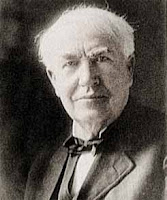Measured by Character
 A few years ago, our family visited the birthplaces of two famous Americans on the same day - inventor, Thomas Edison and former president, Warren G. Harding.
A few years ago, our family visited the birthplaces of two famous Americans on the same day - inventor, Thomas Edison and former president, Warren G. Harding.When we arrived in Milan, Ohio, we immediately noticed that they were proud of their native son, Thomas Edison. A big sign on the edge of the small village proclaimed this was his birthplace. A statue of Edison graced the public square in the center of town. His family home had been restored, with a museum dedicated to his honor. Even the street lights were erected in Edison's memory, as was the Edison Family Restaurant, and the Edison Memorial Methodist Church.
Leaving Milan, I remarked that those folks sure were proud of Thomas Edison - especially considering the fact that he moved away in early childhood.
A couple of hours later, we arrived in Blooming Grove, Ohio, where Warren G. Harding was born.

We were amazed to discover the only thing to denote Harding's birth was a small, faded historical marker in the front yard of a farmhouse.
"How does this figure?" I wondered. "Why does an inventor get a whole town to memorialize him, while a president only gets a dinky little sign?"
It wasn't about power. Harding certainly had much more clout than Edison. It wasn't about fame. Harding was recognized throughout the entire world.
My theory - I think it was about character.
Edison is known today for his persistence, creativity, and determination. He invented the light bulb after over a thousand failures. He's the one who said that genius is 1% inspiration and 99% perspiration.
Harding, on the other hand, is known today for the scandals of his administration, his dishonesty, his immorality, and his willingness to "bend the rules" to fit his agenda.
Edison had character - and the town of his birth still celebrates. Harding was a character - and he gets a sign by the chicken coop.
The moral - the greatness of a person is measured by integrity and truth.
Your position in life is not nearly as important as your disposition.

Again another little sermon. Actually a major sermon, just of few words. Thank you!
ReplyDelete"The moral - the greatness of a person is measured by integrity and truth.
Your position in life is not nearly as important as your disposition."
Then why are so many caught up in 'who they know', or 'what has their name on it'?